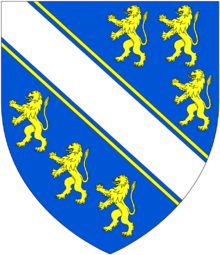
Back همفرى دى بوهون ايرل هيرفورد التالت ARZ Humphrey de Bohun, 3. Earl of Hereford German Humphrey de Bohun, III conde de Hereford Spanish Humphrey de Bohun (3e comte de Hereford) French Humphrey de Bohun, III conte di Hereford Italian Humphrey de Bohun Polish Богун, Хамфри де, 3-й граф Херефорд Russian
Humphrey de Bohun | |
|---|---|
| 3rd Earl of Hereford | |
 Arms of Bohun: Azure, a bend argent cotised or between six lions rampant of the last | |
| Tenure | 1270–1298 |
| Predecessor | Humphrey de Bohun, 2nd Earl of Hereford |
| Other titles | 2nd Earl of Essex |
| Known for | Opposition to Edward I |
| Years active | 1260s–1298 |
| Born | c. 1249[nb 1] |
| Died | 31 December 1298 Pleshey, Essex, England |
| Buried | Walden Priory 52°01′34″N 0°14′42″E / 52.0262°N 0.2449°E |
| Nationality | English |
| Residence | Pleshey Castle |
| Locality | Essex, Wiltshire, Welsh Marches |
| Wars and battles | Welsh Wars |
| Offices | Constable of England |
| Spouse(s) | Maud de Fiennes |
| Issue | Humphrey de Bohun, 4th Earl of Hereford |
| Parents | Humphrey (V) de Bohun Eleanor de Braose |
Humphrey (VI) de Bohun (c. 1249 – 31 December 1298), 3rd Earl of Hereford and 2nd Earl of Essex, was an English nobleman known primarily for his opposition to King Edward I over the Confirmatio Cartarum.[1] He was also an active participant in the Welsh Wars and maintained for several years a private feud with the earl of Gloucester.[2] His father, Humphrey (V) de Bohun, fought on the side of the rebellious barons in the Barons' War. When Humphrey (V) predeceased his father, Humphrey (VI) became heir to his grandfather, Humphrey (IV). At Humphrey (IV)'s death in 1275, Humphrey (VI) inherited the earldoms of Hereford and Essex. He also inherited major possessions in the Welsh Marches from his mother, Eleanor de Braose.
Bohun spent most of his early career reconquering marcher lands captured by Llywelyn ap Gruffudd during the Welsh war in England. This was finally accomplished through Edward I's war in Wales in 1277. Hereford also fought in Wales in 1282–83 and 1294–95. At the same time he also had private feuds with other marcher lords, and his conflict with Gilbert de Clare, Earl of Gloucester, eventually ended with the personal intervention of King Edward himself. Hereford's final years were marked by the opposition he and Roger Bigod, Earl of Norfolk, mounted against the military and fiscal policy of Edward I. The conflict escalated to a point where civil war threatened, but was resolved when the war effort turned towards Scotland. The king signed the Confirmatio Cartarum—a confirmation of Magna Carta—and Bohun and Bigod agreed to serve on the Falkirk Campaign. Bohun died in 1298, and was succeeded by his son, Humphrey de Bohun, 4th Earl of Hereford.
Cite error: There are <ref group=nb> tags on this page, but the references will not show without a {{reflist|group=nb}} template (see the help page).
© MMXXIII Rich X Search. We shall prevail. All rights reserved. Rich X Search